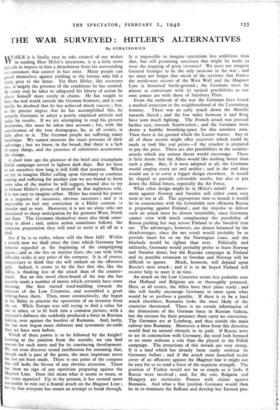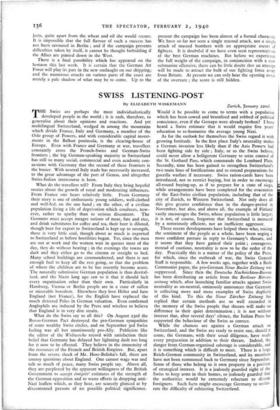ME WAR SURVEYED: HITLER'S ALTERNATIVES
By STRATEGICUS
WAILE it is fatally easy to take counsel of our wishes in reading Herr Hitler's intentions, it is a little more difficult to impute to him a detachment from his surrounding circumstances that cannot in fact exist. Many people can guard themselves against yielding to the former who fall a ready prey to the latter. Yet Herr Hitler, like everyone else, is largely the prisoner of the conditions he has created. By every step he takes to safeguard his liberty of action he places himself more surely in chains. He has sought to keep the real world outside the German frontiers, and it can hardly be doubted that he has achieved much success ; but, in the precise degree that he has accomplished this, he compels Germans to adopt a purely empirical attitude and judge by results. If we are attempting to read his present intentions, this must be taken into account ; for, with the sensitiveness of the true demagogue, he, at all events, is fully alive to it. The German people are suffering many hardships. We cannot measure the exact pressure of their sufferings ; but we know, in the broad, that there is a lack of many things, and the presence of substitutes accentuates the change.
A short time ago the glamour of the brief and triumphant Polish campaign served to lighten dark days. But we have to ask ourselves how long it will fulfil that purpose. When we try to imagine Hitler calling upon Germany to continue waiting and suffering for another year we are bound to form some idea of the motive he will suggest, bound also to try to fathom Hitler's picture of himself in that inglorious role. It is not easy to imagine either. Hitler has reared his power on a sequence of successes, obvious successes ; and it is impossible to feel any conviction in a Hitler content to thunder and to wait. Moreover, it is not we alone who are stimulated to sharp anticipation by his gestures West, North and East. The Germans themselves must also think some- thing is afoot ; and, unless action sometimes follows, the elaborate preparation they will tend to write it all off as a bluff.
But if he is to strike, where will the blow fall? Within a month now we shall enter the time which Germany has hitherto regarded as the beginning of the campaigning season ; and as she lies on interior lines, she can with little difficulty strike at any point of the compass. It is, of course, unnecessary to think that she will embark on the offensive gaily. Indeed, it seems to be the fact that she, like the Allies, is thinking less of the attack than of the counter- attack. But on this novel chess-board of the war she has recently made a number of moves which certainly have some meaning. She first started road-building towards the frontiers of the Low Countries, and assembled a great striking-force there. Then, more ostentatiously, she began in the Baltic to practise the operations of an invasion from the sea. While Europe was still trying to find a value for one or other, or to fit both into a common picture, with a conjurer's deftness she suddenly produced a force in Russian Galicia, over against the borders of Rumania. And, lastly, she has now begun more elaborate and systematic air-raids than we have seen before.
Which of these pawns is to be followed by the knight? Looking at the position from the outside, we can find reasons for each move and for its convincing development. We can even discover sound justification for assuming that, though each is part of the game, the most important move has not yet been made. There is one point of the compass that still lacks the favour of any obvious attention. There has been no sign of any operation preparing against the Maginot Line. Does this mean what it seems to mean, or the exact opposite? Up to the present, it has seemed more reasonable to rule out a frontal attack on the Maginot Line ; but by that everyone has meant an attempt to break through. Is it impossible to imagine operations less ambitious than that, but still promising successes that might be made to wear the trapping of great victories? We must not imagine General Georges to be the only tactician in the war ; and we must not forget that much of the territory that frames the north-west sectors of the West Wall and the Maginot Line is historical battle-ground ; the Germans must be almost as conversant with its tactical possibilities as our own armies are with those of Salisbury Plain.
From the outbreak of the war the Germans have found a marked attraction in the neighbourhood of the Luxemburg frontier. There was an early attack down the Moselle towards Sierck ; and the few miles between it and Borg have seen much fighting. The French attack was pressed farther east, towards Saarbrucken ; and the Germans must desire a healthy breathing-space for this sensitive area. Then there is the ground which the Lauter waters. Any or all of these sectors might offer successes which could be made to look like real prizes—if the attacker is prepared to pay the price. There are also possibilities in the counter- attacks which any serious threat would encourage. There is little doubt that the Allies would like nothing better than such a plan. But, if it were adopted at all, the Germans would employ every art and artifice ; and in the end they would use it to cover a bigger design elsewhere. It would be shaped to provide colourable results, but also to pin down the Allied forces, especially the Air Force.
What other design might be in Hitler's mind? A move- ment against Norway and Sweden will either come very soon or not at all. The appropriate time to launch it would be in conjunction with the formidable new offensive Russia is preparing against Finland ; and the impulse to deliver such an attack must be almost irresistible, since Germany cannot view with much complacency the possibility of Russia pushing her way across Finland to the Swedish iron ore. The advantages, however, are almost balanced by the disadvantages, since the net result would probably be to provide bases for us on the Norwegian coast, and the blockade would be tighter than ever. Politically and militarily, Germany would probably prefer to leave Norway and Sweden alone; but the Russian campaign in Finland and its possible extension to Sweden and Norway will be difficult to ignore. Much, however, will depend upon Russia's next attack ; and it is to be hoped Finland will receive help to meet it in time.
An attack on the Low Countries seems less probable now that Holland and Belgium are so thoroughly prepared. Here, at all events, the Allies have their plans ready ; and this will hardly encourage Germany to enter upon what would be so perilous a gamble. If there is to be a land attack elsewhere, Rumania looks the most likely of the countries threatened. There is no certain information of the dimensions of the German force in Russian Galicia, but the excuses for their presence there carry no conviction. The Germans are at Lemberg, and thus astride the main railway into Rumania Moreover, a blow from this direction would find no natural obstacle in its path. If Russia were to act in conjunction with Germany, she need look forward to no more arduous a role than she played in the Polish campaign. The attractions of this terrain are very strong. It is a land which has already been easily overrun by Germany before ; and if the attack were launched under cover of an offensive against the Maginot line it might not be easy for us to send a force of the requisite strength. The position of Turkey would not be so simple as it looks if Russia were involved ; and, for the rest, Bulgaria and Hungary are revisionist Powers with claims against Rumania. And what a fine position Germany would then be in to dominate the Balkans and develop her Eastern pro- jects, quite apart from the wheat and oil she would secure. It is impossible that the full flavour of such a success has not been savoured in Berlin ; and if the campaign presents difficulties taken by itself, it cannot be thought forbidding if the Allies are pinned down in the West.
There is a final possibility which has appeared on the horizon this last week. It is certain that the German Air Force will play its part in the new onslaught on our shipping; and the numerous attacks on various parts of the coast are merely a pale shadow of what may be to come. Up to the present the campaign has been almost of a formal character. We have so far not seen a single massed attack, not a single attack of massed bombers with an appropriate escort of fighters. It is doubtful if we have even seen representatives of the best German machines. But before we experience the full weight of the campaign, in conjunction with a new submarine offensive, there can be little doubt that an attempt will be made to attract the bulk of our fighting force away from Britain. At present we can only hear the opening notes of the overture ; the score is still hidden.







































 Previous page
Previous page